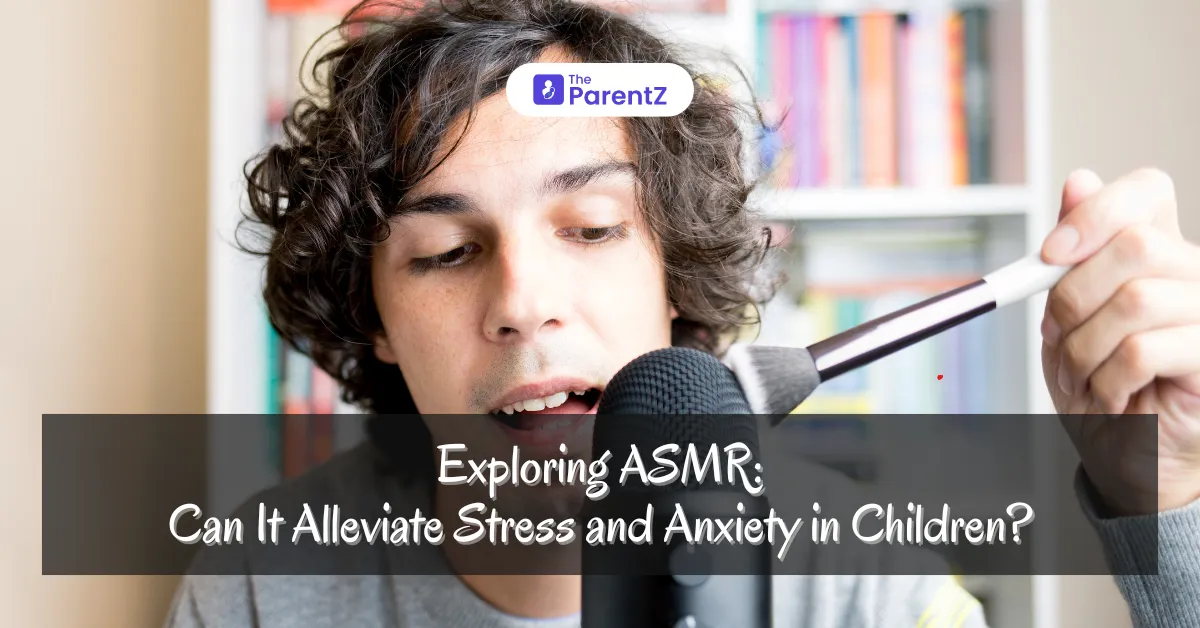Have you ever heard your kids talking about ASMR and wondered what all the fuss is about? Maybe you've even caught them watching videos of people whispering or tapping on objects. It's become a huge trend, especially on platforms like TikTok, Instagram, and YouTube, and it's got many parents scratching their heads. So, let's dive into the world of ASMR and see if it can actually help our kids manage stress and anxiety.
What Exactly is ASMR?
ASMR stands for "Autonomous Sensory Meridian Response". It describes a tingling sensation that some individuals experience in response to particular visual, auditory, or tactile stimuli. This sensation typically starts on the scalp and travels down the neck and spine. People often describe it as a feeling of relaxation, calmness, and even euphoria. Think of the goosebumps you might get when someone whispers in your ear – that's ASMR!
Common ASMR triggers include:
- Whispering
- Tapping
- Scratching
- Gentle hand movements
- Personal attention
- Crisp sounds
The triggers are different for everyone, which is why some kids might love ASMR videos while others don't get anything from them.
The Social Media Sensation
If you've been on TikTok, YouTube, or Instagram lately, you've probably noticed ASMR content everywhere. From slime-poking videos to gentle storytelling, ASMR creators (known as ASMRtists) have amassed millions of followers. Kids are particularly drawn to ASMR content featuring colorful slimes, kinetic sand, and soft-spoken storytelling.
Why is ASMR So Popular?
ASMR's popularity has exploded in recent years, especially among kids and teens on social media. There are a few reasons for this:
- Stress Relief: In our fast-paced, high-pressure world, kids are dealing with more stress and anxiety than ever before. ASMR offers a low-stakes means of self-soothing. The gentle noises and rhythmic tasks can kick-start a calming response in the brain.
- Accessibility: ASMR content is readily available on platforms like YouTube and TikTok. Kids can easily access these videos whenever they need a moment of relaxation.
- Relatability: ASMR mimics some of the same sensations that babies experience while bonding with their parents. Soft touches, caring and loving glances, focused attention, and gentle whispers are all signs of caring parents and ASMR triggers.
- Sleep Aid: ASMR videos played before bed can help kids unwind and relax their minds, helping them fall asleep.
Can ASMR Really Alleviate Stress and Anxiety in Children?
The big question is: can ASMR actually help kids manage stress and anxiety? While research on ASMR in children is still limited, some studies suggest that it can have a positive impact.
Here's what we know:
- Reduces Stress: Research suggests that ASMR content activates areas of the brain associated with relaxation. This indicates a potential for a stress-reducing effect.
- Encourages Self-Regulation: ASMR provides another option in a child's "coping toolbox" for managing emotions and situations. In this sense, it encourages self-regulation.
- Improves Mood: Research has linked ASMR to improved mood in people who experience "tingles." Those who respond to ASMR videos may also experience a reduced heart rate, as well as temporary relief in symptoms of depression and chronic pain.
- May Improve Focus: Studies have associated it with cognitive benefits like better attentional performance and decision-making.
- Release of Endorphins: ASMR's relaxing sensations may be related to the release of endorphins, a chemical in the brain that leads to feelings of happiness.
Dr. Craig Richard, an ASMR researcher, suggests that kids benefit from real-world ASMR all the time. Loving touches, gentle whispers, and caring gazes from parents can be incredibly soothing.
Potential Risks and Concerns
While ASMR can be beneficial, it's important to be aware of potential risks:
- Inappropriate Content: Not all ASMR content is suitable for children. There is a variety of adult ASMR that kids should not access.
- Overstimulation: Some ASMR triggers might be unsuitable for kids with specific sensitivities or vulnerabilities, and it can lead to overstimulation in these cases.
- Addiction: Liking ASMR too much may make kids spend a lot of time just observing it.
- Dependence: If kids lean on ASMR videos as quick fixes for every little stressor, it could get in the way of learning other coping skills.
How to Introduce ASMR Safely and Effectively?
If you're considering introducing your child to ASMR, here are some tips:
- Start with Real-World ASMR: Focus on creating a calming and nurturing environment at home. Soft touches, gentle whispers, and focused attention can go a long way.
- Explore Content Together: Watch ASMR videos with your child to understand why they like it and to ensure the content is appropriate.
- Set Screen Time Limits: Use parental control tools to monitor and handle your child's screen time.
- Talk About Online Safety: Explain what videos should not be consumed and why they should be avoided.
- Encourage Other Activities: Make sure your kids have a variety of other activities throughout the week, such as sports, hobbies, reading, or playing outside.
- Moderation is Key: Prioritize teaching your child how to manage difficulties without the crutch of online videos, which will serve them in the long run.
- Pay Attention to Your Child's Response: You know your child best, so pay attention to their response to ASMR videos. If they seem agitated or overstimulated, it might not be the right tool for them.
Conclusion
ASMR can be a helpful tool for alleviating stress and anxiety in some children. It offers a way to relax, self-soothe, and even improve focus. However, it's important to approach ASMR with caution and awareness. By monitoring content, setting limits, and encouraging a balanced lifestyle, you can help your child enjoy the benefits of ASMR without the risks.
Remember, every child is different. What works for one child might not work for another. Engage with your child, understand their needs, and make informed decisions about whether ASMR is right for them.








Be the first one to comment on this story.